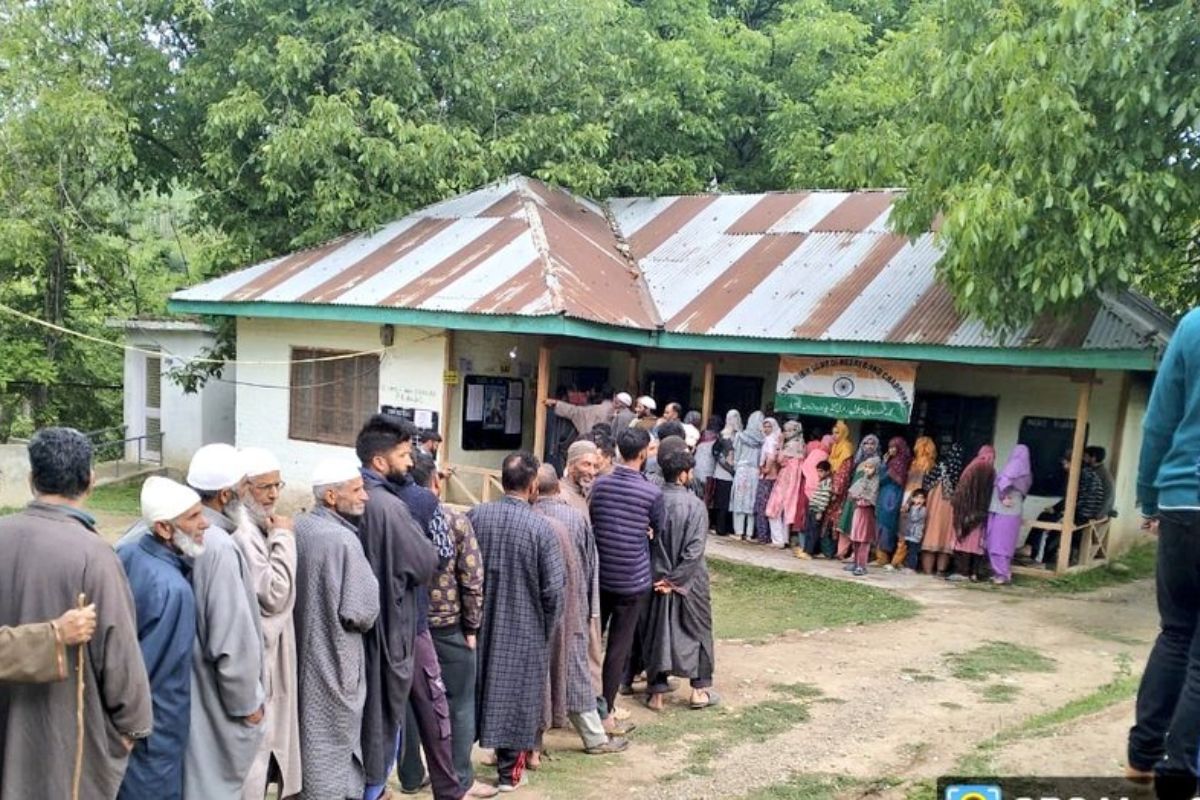LG Sinha performs yoga in Srinagar, says ‘Yoga reduces stress and enhances quality of life’
The Lieutenant Governor said that in today's fast-paced world, the importance of yoga is immeasurable.
Despite there being no poll boycott call this time, the polling percentage remained 36.1 in the constituency till 5 pm yet it was better than the 2019 Lok Sabha elections.
SP Sharma | Jammu | May 13, 2024 7:21 pm

Photo: Queue at a polling booth in Pulwama
Breaking the jinx of being the epicentre of terrorism and poll boycotts, people in large numbers lined up outside polling booths in south Kashmir’s Pulwama and Shopian to cast their vote on Monday as the Srinagar Lok Sabha constituency went to polls amidst tight security.
Despite there being no poll boycott call this time, the polling percentage remained at 36.1 in the constituency till 5 pm yet it was better than the 2019 Lok Sabha elections when 14.43 per cent votes were polled and 7.12 per cent in the by-election in 2017. The final voting percentage till 6 pm is awaited.
Advertisement
A lot of enthusiasm was witnessed among the electorate as men and women queued at the polling booths across the constituency even before the voting began at 7 am. Long queues of voters were seen in the Pulwama, Shopian, and Ganderbal districts.
Advertisement
The chief electoral officer (CEO) of J&K conveyed his gratitude to the voters of Srinagar, Budgam, Shopian, Ganderbal, and Pulwama districts for coming to cast their votes in large numbers. “There is festivity and normalcy in every polling station!” he exclaimed.
Among the three Lok Sabha constituencies in the Kashmir Valley, Srinagar with 17.48 lakh registered voters was the first to go to polls. The Baramulla and Anantnag constituencies will go to polls on 20 and 25 May respectively.
The constituency witnessed 15.08 per cent polling in the first four hours till 11 am and it gradually increased to 23.79 per cent at 1 pm and 30.23 per cent at 3 pm. The Kangan assembly segment in Ganderbal recorded the highest 55.55 per cent polling till 5 pm.
The downtown area of Srinagar, where not a single vote was cast at least in 70 polling stations in the 2019 elections, witnessed enthusiasm this time. The Eidgah locality that had remained the hub of stone pelting for three decades recorded 25.68 per cent polling till 5 pm. Zadibal polled 27.52 per cent, Khanyar 23.06 per cent, and Habbakadal 13.25 per cent till 5 pm.
The Pulwama and Shopian districts, known to be hotbed of terrorism, were among the places where polling touched 39.25 per cent and 45.04 per cent marks by 5 pm.
The Kashmiri Pandit migrants also came out to cast their vote in Jammu, Udhampur, and Delhi where special polling booths were set up for them.
Although there are 24 candidates in the fray, the key contest is between Aga Syed Ruhullah Mehdi of the National Conference (NC) and the youth leader of the PDP Waheed-ur-Rehman Parra in Srinagar that has been represented by three generations of the Abdullah family.
Aga Ruhullah is a well-known Shia cleric and a former MLA of Budgam and also a cabinet minister. He is the grandson of Aga Syed Mustafa, who was a respected Shia leader.
On the other hand, Parra was arrested by the National Investigating Agency (NIA) on 25 November 2020 on a charge of terror links. He was re-arrested by the J&K Police after getting bail from the special NIA court. He was in the district development council election in 2020 from Pulwama while in jail. He was later released on bail by the high court.
While the BJP is not contesting on any of the three Lok Sabha seats, it is reportedly supporting the Apni Party of Altaf Bukhari and the Peoples Conference of former separatist Sajad Lone from behind the scene. The saffron party is confident that the elections in the Valley would end the domination of the NC and the PDP in the region.
The Congress too has not fielded its candidates in Kashmir but is supporting the NC.
This is the first time since 1998 that no member of the Abdullah family is contesting the Lok Sabha elections from Srinagar. The only loss the NC suffered on this seat was in the 2014 general elections. This is the first major election in Kashmir after the abrogation of Article 370, which granted special status to the erstwhile state of Jammu and Kashmir. The article was revoked in 2019, leading to the bifurcation of the state into the Union Territories of Jammu and Kashmir and Ladakh.
Three generations of the Abdullah family led by the sitting MP Dr. Farooq Abdullah cast their vote early in the morning. Farooq Abdullah, his son Omar Abdullah, and his two grandsons and first-time electors Zahir and Zamir cast their vote at the polling station at the Burn Hall School in Srinagar.
A senior PDP leader and former minister, Naeem Akhtar complained of a slow voting process at certain booths.
Reacting to these complaints, the chief electoral officer (CEO) of J&K said; “It is to clarify that the speed of EVM is the same everywhere. Polling staff is working diligently to facilitate all. Normally there used to be very less poll percentage and less number of voters in queues”.
Advertisement
The Lieutenant Governor said that in today's fast-paced world, the importance of yoga is immeasurable.
The UN's nuclear watchdog’s Board of Governors Thursday adopted a resolution declaring that Iran was not complying with its commitment to international nuclear safeguards
The train service will boost tourism and the local economy, he said.
Advertisement
